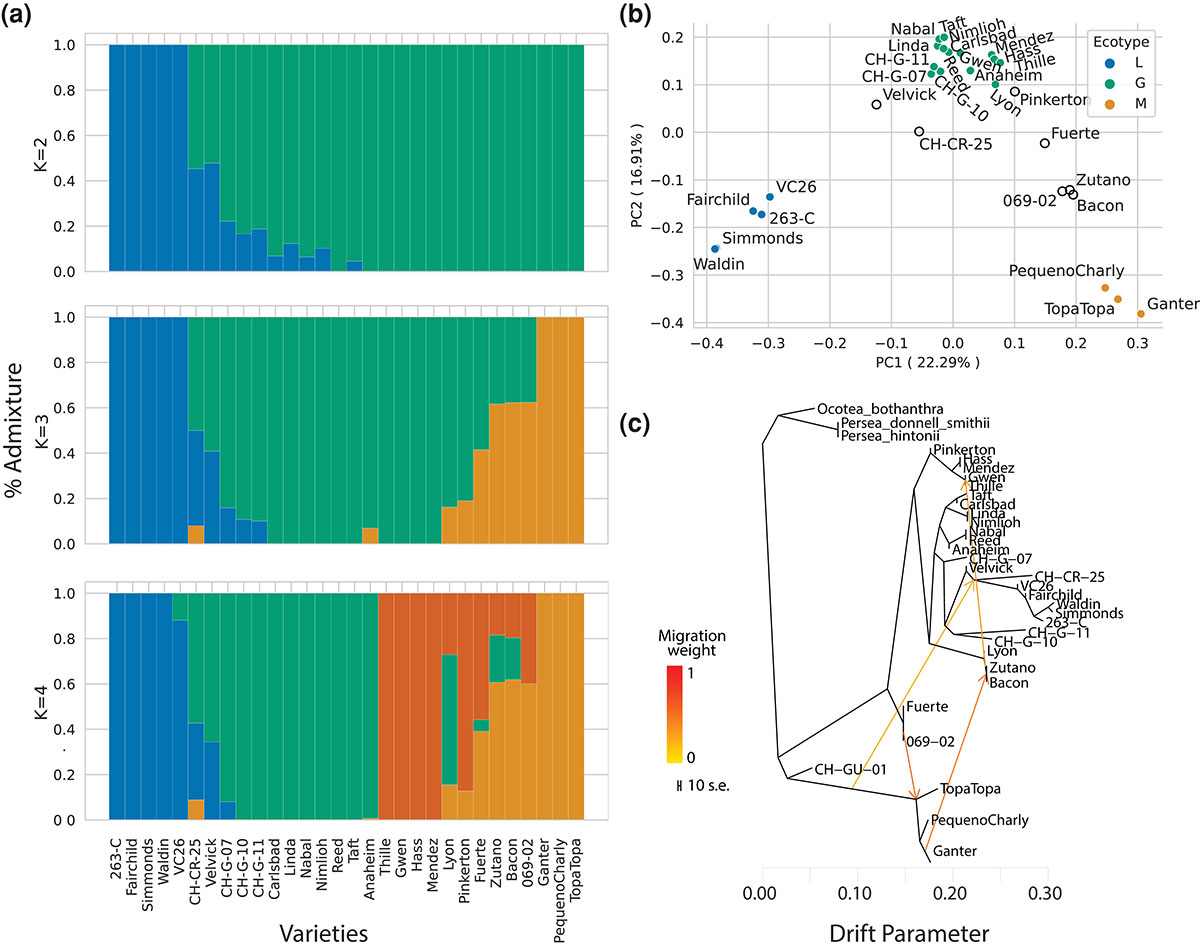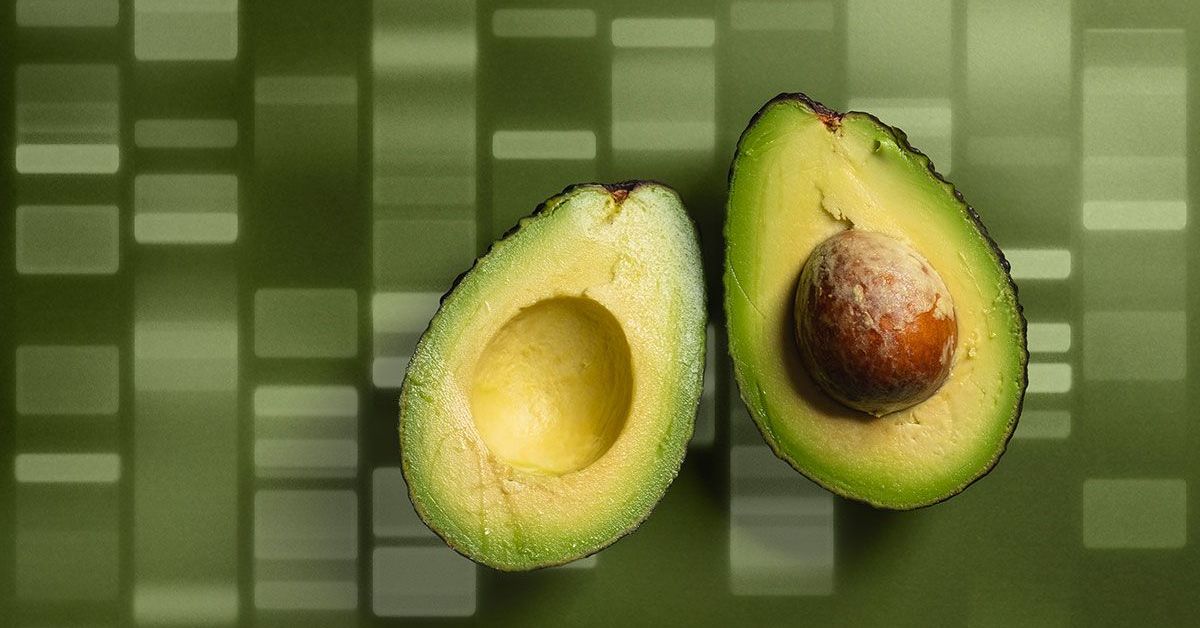Avocado Genome is at the Center of New Study
University of California researchers use supercomputers to harvest data about the popular fruit’s complex genetics
Story by:
Media contact:
Published Date
Story by:
Media contact:
Share This:
Article Content
Despite the popularity of the avocado, the fruit is dominated by a single variety: Hass. A perennial, subtropical crop grown in both the U.S. and Mexico, the Hass has some breeding challenges. So University of California (UC) researchers turned to “Gwen,” a descendant variety of Hass, in an effort to map a different avocado (Persea americana) genome to further explore the fruit’s evolutionary history.
UC President’s Postdoctoral Fellow at UC Davis, Edwin Solares and his team used Expanse at the San Diego Supercomputer Center (UC San Diego) and Bridges and Bridges-2 at the Pittsburgh Supercomputing Center (Carnegie Mellon) to run genome assembly, alignment and simulations for the study, conducted while Solares was a postdoctoral researcher at UC Irvine’s Department of Ecology and Evolutionary Biology. Results of the study were recently published in an article entitled, Insights into the domestication of avocado and potential genetic contributors to heterodichogamy in the Genes, Genomes, Genetics journal.
Solares explained that the Hass avocado accounts for approximately 90 percent of avocado cultivation worldwide, thus dominating the market. Yet avocados are very genetically diverse mainly because there are three botanically domesticated groups: Lowland (also known as West Indian), Mexican and Guatemalan.
“Due to the different morphologies of the avocados between the groups and genetic data, it is suggested that they have been domesticated separately,” Solares said. “Because of this, the groups likely have varying alleles and therefore different genes of interest for crop improvement.”
According to the scientist, this is important because avocado breeding currently remains challenging due to the fruit’s slow maturity, reproductive system and heterodichogamy nature — trees exhibit both male and female traits but at different times of the day.
“Because the Hass genome is the only variety of avocados that has been deciphered, we chose to map the genome of ‘Gwen,’ a different variety of avocado, to use it for evolutionary analysis of the avocado,” Solares said. “The Gwen avocado is largely unexplored, so we examined the domestication history and chromosomal regions of potential agronomic interest using evolutionary genomic tools with a focus on genomic diversity in the context of interesting traits, like A vs B flowering types.”
The Gwen variety contains similar characteristics of the Hass but produces higher yields and presents better fruit storage on the avocado tree. It has been subjected to intensive breeding efforts for the past three decades, partly motivating researchers to create a Gwen reference, such as the one that Solares developed in his work.
“We utilized a whole-genome resequencing data set including 34 avocado accessions and produced a genome of 1,456 Mb with 5,122 contigs,” Solares said. “Our analyses implied that three independent domestication events occurred due to the presence of genetic mutations unique to each of the three groups, with Mexican avocados being the most genetically distant.”

He explained that the estimated divergence time varied from approximately 40,000 years between the Lowland and Guatemalan groups to over a million years between Mexico and two other groups. These are both much older than the expected domestication time of other perennial crops, making it likely that the source of this divergence eventually became the source of domestication and possible introduction of genes from other species of Persea.
“We also discovered that Hass, which was previously thought to be of hybrid origin (i.e., 50% Mexican and 50% Guatemalan), was Guatemalan in origin – contrary to other studies,” Solares said. “However, we removed hybrid samples making sample sizes vary between groups, which could have also led to some of the variances seen in results between groups.”
Solares and the team also completed the first attempt to define genomic regions that may contribute to hetero-dichogamy. They have documented a peak on chromosome 10 and additional useful observations that will be further analyzed utilizing SDSC resources.
“Future work will focus on additional genome sequencing and analyses of A vs B genomes, on characterizing segregation patterns of polymorphisms within candidate genes in a larger sample of A vs B avocado accessions, and also on searching for trans-specific polymorphisms (Charlesworth 2006) across species of the Lauraceae, since heterodichogamy is also found in other Lauraceae species,” Solares said.
This research was supported by a U.S. Department of Agriculture (grant no. 2020-04640). Computational work used the Extreme Science and Engineering Discovery Environment (XSEDE), which is supported by National Science Foundation (grant nos. ACI-1548562, MCB190050 and MCB180035).
Share This:
You May Also Like
UC San Diego is Strengthening U.S. Semiconductor Innovation and Workforce Development
Technology & EngineeringStay in the Know
Keep up with all the latest from UC San Diego. Subscribe to the newsletter today.




